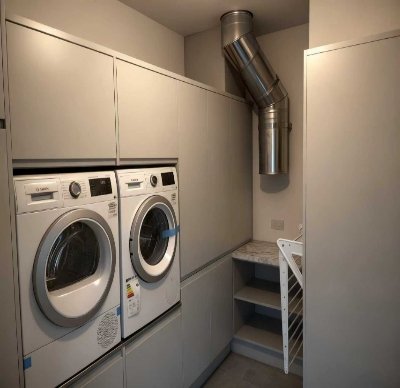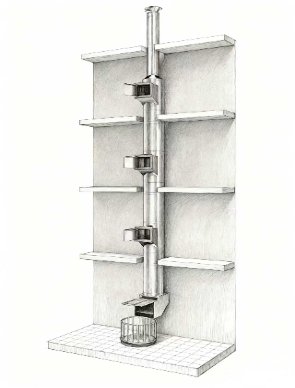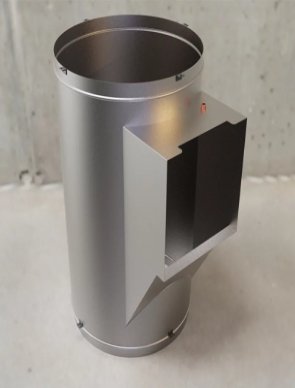Discover if adding a laundry chute to your home is a wise move. This article explains its design, benefits like saving time and reducing clutter, and key factors such as costs and safety. Perfect for multi-level homes seeking easier laundry routines.

A laundry chute gives an easy method to send soiled clothes from upper levels to the washing area beneath. Some folks say laundry shoot. It makes daily tasks smoother in homes with several floors. Now let’s look at the details.
In simple terms, a laundry chute is a straight pipe or passage placed inside walls. Gravity does the work of pulling clothes downward. Builders often use tough pipes crafted from stainless steel or galvanized steel. Such choices fight rust and stay strong over time.
Entry doors appear on higher floors. They shut on their own and feature shiny stainless steel surfaces. Handles plus locks keep things secure. You lift the door, toss in garments, then seal it shut. Everything drops to a collection spot below.
At the base, a hopper or sliding panel waits. This part holds the items in a hamper or container. Certain models include fire-safe parts, such as fusible links that seal doors during extreme heat. Sprinklers and vents may join the setup to satisfy safety rules.
In practice, gravity powers the whole thing, and no wires or motors are required. That keeps it dependable and simple to care for. Firms like Qingdao Chute Equipment Co., Ltd. focus on these setups. They supply adjustable sizes, for instance, 24-inch diameters, which match typical guidelines.

Laundry chutes suit multi-level houses best. Upper-floor bedrooms or restrooms serve as great places for entry doors. Such spots let household members drop clothes where they undress.
The passage travels straight down through walls or storage areas. It finishes in a basement or main-level washroom. A few houses link it to a service space. Steer clear of spots near cooking zones or family rooms to stop smells.
When constructing fresh homes, include it early. For older ones, adding later is doable yet needs wall changes. Typical placements cover hallways or primary bedrooms for quick reach.
Putting in a laundry chute delivers many gains. It alters the way you manage soiled garments. Households with children or packed days find it very useful. Below are the chief upsides.
Forget hauling full baskets down steps. Drop clothes right into the laundry chute from any level. This cuts trips and eases strain. Mornings flow better when all can pitch in without trouble.
Sorting speeds up, too. Garments arrive together, set for the wash. You spend less time hunting through rooms. In big houses, this perk truly stands out.
Soiled items tend to stack in sleeping areas or washrooms. A laundry chute tucks them out of sight. Clothes head straight below, leaving rooms neat. Your whole house stays tidier. No more hampers spilling into walkways. Order stays strong, mainly in busy families.
Owning a chute turns washing into less work. Children quickly learn to drop items in. Good routines start young.
Frequent washing happens more often. Easy dropping means smaller piles. Families handle laundry without stress.

Prior to choosing to build a laundry chute, balance the good points against possible downsides. Not all houses fit this upgrade. Look closely at your space and funds.
Laundry chutes shine in homes with two stories or more. Vertical room is essential for the passage. Make sure walls line up from top to bottom.
Single-story places rarely need one. Check for open space. Adjustable sizes aid, but cramped areas can create issues.
Stainless steel costs extra at first but endures longer. Simple kits begin at a few hundred dollars. Tailored versions raise the price.
Labor increases the total. Self-install works with manuals, yet experts guarantee safety. Add in permits and wall fixes. Plan for $500 to $2,000 or beyond.
Safety ranks highest. Review the area building rules. Most demand fire-rated doors and sprinklers.
Confirm the chute follows standards like UL ratings. Good venting stops smells and mildew. Bring in pros to dodge problems.
A:A laundry chute is a vertical tube in homes for dropping dirty clothes to the laundry area. It uses gravity for easy transport.
A:Common materials include stainless steel, like SS304 or SS316. These are durable and corrosion-resistant. Custom options are available.
A:Install in multi-story homes, with intake doors in bedrooms or bathrooms. The chute ends in the laundry room below.
A:Clean regularly to prevent clogs. Use a flushing system if available. Check doors and locks for smooth operation.
A:Yes, with fire-rated doors and sprinklers. Follow building codes to ensure safety.
A:Yes, they specialize in linen chutes, which work as laundry chutes. They provide design, manufacturing, and customization.
A:Typically, one year. It covers manufacturing defects with free repairs or replacements.
A:Yes, companies like QDCE offer guides or on-site technicians.
A:Standard sizes are 24, 30, or 36 inches in diameter. Custom sizes fit specific needs.
A:Homes, hotels, hospitals, and commercial buildings benefit from them.
Fill in the email to subscribe to email, so that you can know our latest quotations and activities at any time